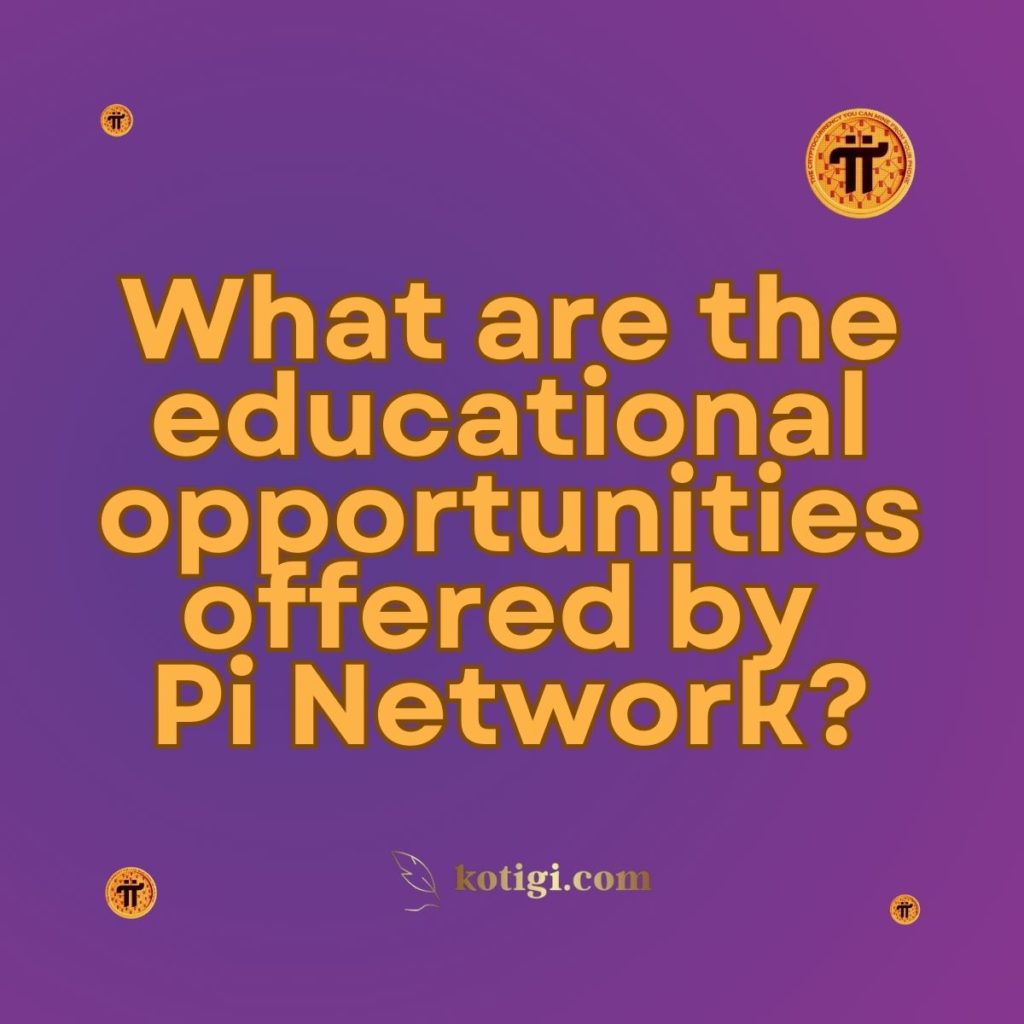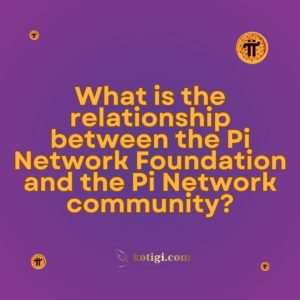
What are the educational opportunities offered by Pi Network?
Pi Network offers various educational opportunities through its community resources, online courses, developer tools, and hackathons. These initiatives empower users to learn about blockchain technology, cryptocurrency, decentralized applications (dApps), and entrepreneurial development within Pi’s ecosystem.
Introduction
Education plays a vital role in the long-term success of blockchain ecosystems, and Pi Network recognizes the importance of fostering knowledge and skill-building within its community. Beyond being a cryptocurrency platform, Pi Network offers various learning opportunities to educate users, developers, and entrepreneurs about blockchain technology and its applications. From community forums and educational hubs to developer tools and hackathons, Pi provides multiple channels for learning and growth.
This post explores the educational initiatives Pi Network offers, such as developer programs, online courses, community-led tutorials, and entrepreneurship guidance, positioning Pi as more than just a blockchain project.
Developer-Focused Education
Pi Developer Portal
Pi Network provides a dedicated developer portal where developers can access technical documentation and tutorials to build decentralized applications (dApps) within the Pi ecosystem. The portal offers comprehensive guides for setting up Pi nodes, creating blockchain-based applications, and integrating Pi tokens into existing platforms.
Smart Contract Programming Courses
To foster blockchain development, Pi Network offers online resources focused on teaching smart contract programming. These courses introduce users to blockchain coding concepts using languages like Solidity, enabling them to deploy smart contracts on Pi’s platform and beyond.
Incentives Through Hackathons
Pi Network organizes hackathons that encourage developers to create innovative dApps within its ecosystem. Participants not only gain hands-on experience but also receive mentorship from experts and have a chance to win Pi tokens and other prizes, reinforcing learning through competition.
Community-Based Learning
Fireside Forums and Discussions
Pi Network facilitates open discussions through its Fireside Forum, where users can engage with the community to learn more about blockchain technology, cryptocurrency trends, and ecosystem developments. These forums provide a collaborative space for knowledge sharing and networking.
Online Tutorials and Community Wiki
The community contributes to educational content through Pi’s Wiki and other user-generated tutorials. These resources help new users understand how to mine Pi, set up wallets, and participate in governance processes. The Wiki acts as a repository of valuable information, maintained by contributors who share practical insights.
Social Media Channels as Learning Platforms
Pi Network leverages its social media channels to share educational updates, explain blockchain concepts, and provide step-by-step guides for beginners. Regular updates from platforms like Twitter, Medium, and Telegram ensure that users stay informed and educated.
Business and Entrepreneurship Guidance
Encouraging Ecosystem Entrepreneurship
Pi Network promotes entrepreneurial education by encouraging Pioneers to develop business models within its ecosystem. Entrepreneurs can learn how to build and launch projects, manage decentralized applications, and explore token-based business models.
Training Through Brainstorm App
Pi’s Brainstorm app offers an innovative way for users to share business ideas and collaborate on projects. Participants learn the process of pitching ideas, receiving feedback, and refining concepts, thus gaining entrepreneurial experience while actively contributing to the Pi ecosystem.
Mentorship Opportunities
Pi Network occasionally offers mentorship programs through hackathons and special initiatives, where experienced developers and business leaders guide new participants. This structured mentorship helps individuals acquire practical knowledge in blockchain development and entrepreneurial management.
KYC and Compliance Education
Educational Material on KYC Processes
Pi Network offers resources explaining the Know Your Customer (KYC) process, which is essential for users who want to transition to the Mainnet. Educational material ensures users understand the importance of compliance and provides step-by-step instructions for completing the KYC process.
Blockchain Compliance Training
In addition to user-focused education, Pi Network provides insights into blockchain compliance and regulatory frameworks. This helps users and developers understand the evolving legal landscape and how to ensure their activities align with international standards.
Security Awareness Programs
Pi Network emphasizes the importance of security and offers awareness programs on topics such as wallet safety, phishing prevention, and safeguarding passphrases. These initiatives educate users on best practices for securing their Pi tokens and wallets.
Practical Learning Through Pi Nodes
Node Installation Tutorials
Pi Network encourages technical users to participate in the blockchain’s infrastructure by running Pi nodes. The platform offers tutorials for setting up and maintaining nodes, helping users gain hands-on experience with blockchain network management.
Learning Through Real-World Experience
Running a node provides users with practical exposure to blockchain operations, including consensus mechanisms and network security protocols. This real-world learning opportunity empowers users to understand the technical underpinnings of Pi Network.
Incentives for Node Operators
Pi Network rewards node operators with incentives, promoting active participation and long-term learning. Operators not only gain practical knowledge but also contribute to the stability and security of the Pi blockchain.
Developer Resources and Toolkits
Access to Software Development Kits (SDKs)
Pi Network provides developers with Software Development Kits (SDKs) to build decentralized applications within its ecosystem. These toolkits contain libraries, templates, and APIs, enabling developers to create Pi-integrated applications with ease.
Collaborative Development Spaces
Developers can collaborate through Pi’s online platforms, sharing insights, code snippets, and troubleshooting advice. This collaborative environment promotes peer-to-peer learning and fosters innovation within the ecosystem.
Workshops and Webinars
Pi occasionally organizes workshops and webinars for developers, providing insights into blockchain trends, coding techniques, and Pi-specific development opportunities. These sessions offer direct engagement with the Core Team and industry experts.
Educational Rewards and Recognition
Incentives for Content Creators
Pi Network rewards users who contribute educational content, such as tutorials, blogs, and forum posts. This incentivizes users to share knowledge while enriching the community’s collective understanding.
Certification Programs
Pi Network plans to introduce certification programs for participants who complete advanced courses or successfully deploy projects on its platform. These certifications validate users’ skills and knowledge, boosting their credibility in the blockchain space.
Community Recognition for Learning Achievements
Pi Network acknowledges learning achievements through social recognition programs, showcasing top contributors and developers on its platforms. This recognition encourages continued participation and fosters a sense of accomplishment within the community.
Conclusion
Pi Network’s educational initiatives empower users to explore blockchain technology, gain entrepreneurial experience, and develop dApps within the ecosystem. Through developer portals, community-led tutorials, hackathons, and business idea-sharing platforms, Pi ensures that learning opportunities are accessible to all. Pi Network’s strategy emphasizes both technical and non-technical education, helping users not only understand the mechanics of blockchain but also apply that knowledge in practical ways.
As the Pi ecosystem grows, these educational programs will play a crucial role in building a knowledgeable and engaged community. With access to mentorship, collaborative tools, and security training, users can confidently explore new opportunities within Pi Network and the wider blockchain space.
Key Takeaways
- Developer Education: Pi Network offers portals, SDKs, and coding tutorials for developers to build dApps.
- Community-Led Learning: Resources such as Fireside Forums and Pi’s Wiki provide community-driven education.
- Entrepreneurial Guidance: Pi promotes business development through the Brainstorm app and mentorship programs.
- KYC and Compliance Training: Users gain insights into KYC processes, regulatory frameworks, and security best practices.
- Practical Learning Through Nodes: Running Pi nodes provides hands-on experience with blockchain operations.
- Workshops and Incentives: Pi Network rewards content creators and developers with incentives and certifications for their contributions.
- Collaborative Spaces: Pi fosters learning through community forums, hackathons, and shared development environments.




